by Brian Hioe
語言:
English
Photo Credit: Brian Hioe
TENS OF THOUSANDS are gathered around the Legislative Yuan, in demonstration of the pan-Blue camp’s planned changes to grant new prosecutorial powers to legislators. According to organizers, 30,000 are present. This occurs despite heavy rain at times.
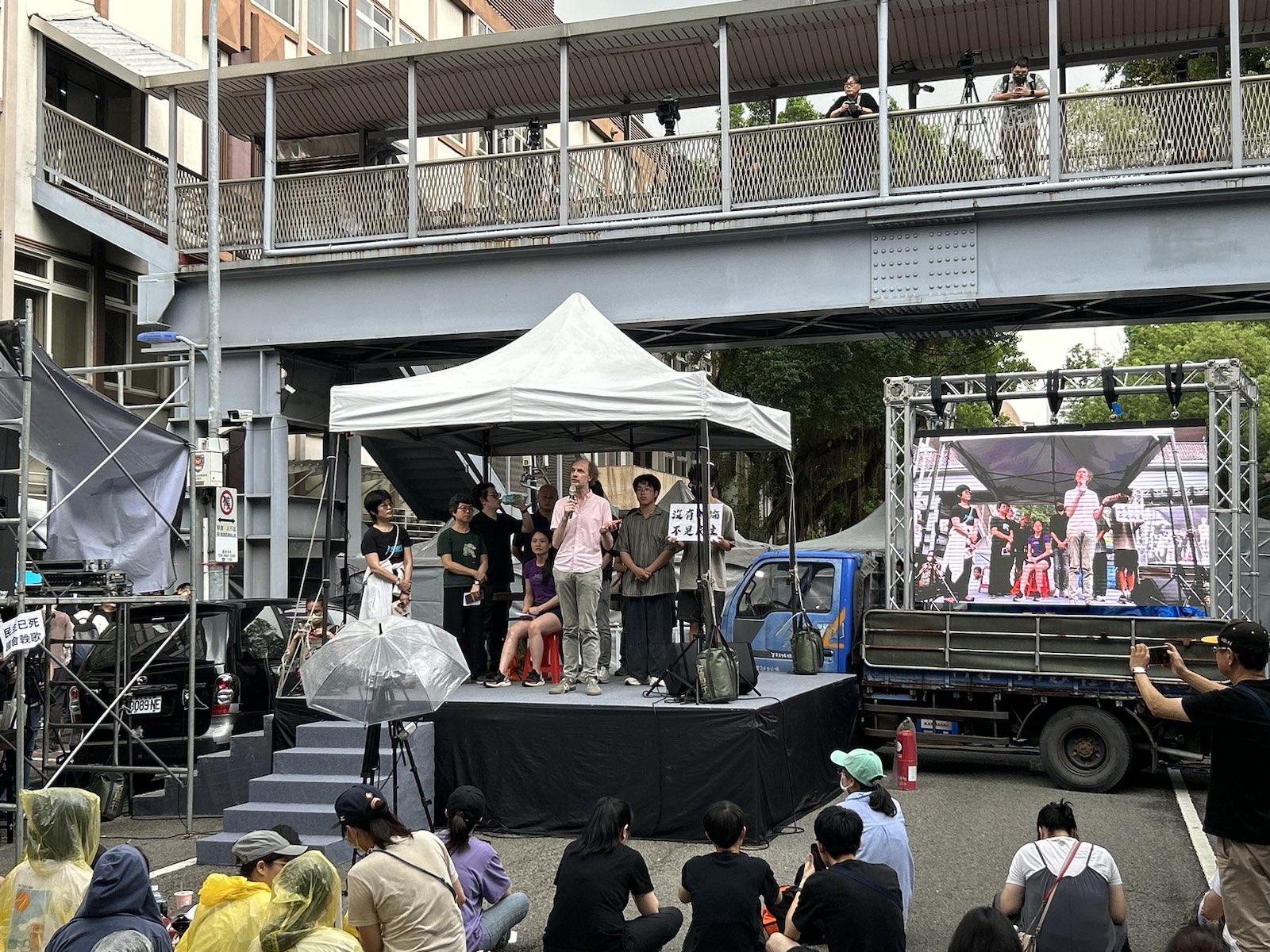 Photo credit: Brian Hioe
Photo credit: Brian Hioe
The KMT and TPP’s legislation would have wide-sweeping effects. In particular, with the new powers granted to legislators, legislators could summon private individuals, government officials, and others for questioning. Those who refuse to comply could face up to three years in jail under criminal charges for contempt of the legislator and individuals could be asked to give up trade secrets, details of confidential negotiations by the government such as diplomatic agreements or arms deals, or other private information. Speaking back to government officials would not be allowed and could lead to a 200,000 NT fine.
It was feared that the new legal changes would be used by the KMT to target political opponents, in particular, by staging highly public show trials. To this extent, the KMT could seek to undermine the stable operations of government using such laws. The pan-Blue camp’s push for such laws takes place after KMT legislator Ma Wen-chun, named by the party to co-chair of the defense committee of the Legislative Yuan, was accused of leaking the confidential details of Taiwan’s domestic submarine program to China and South Korea, and after fellow KMT legislator Hsu Chiao-hsin leaked the confidential details of diplomatic agreements with Czechia, Lithuania, and Ukraine, to try and sink diplomatic cooperation.
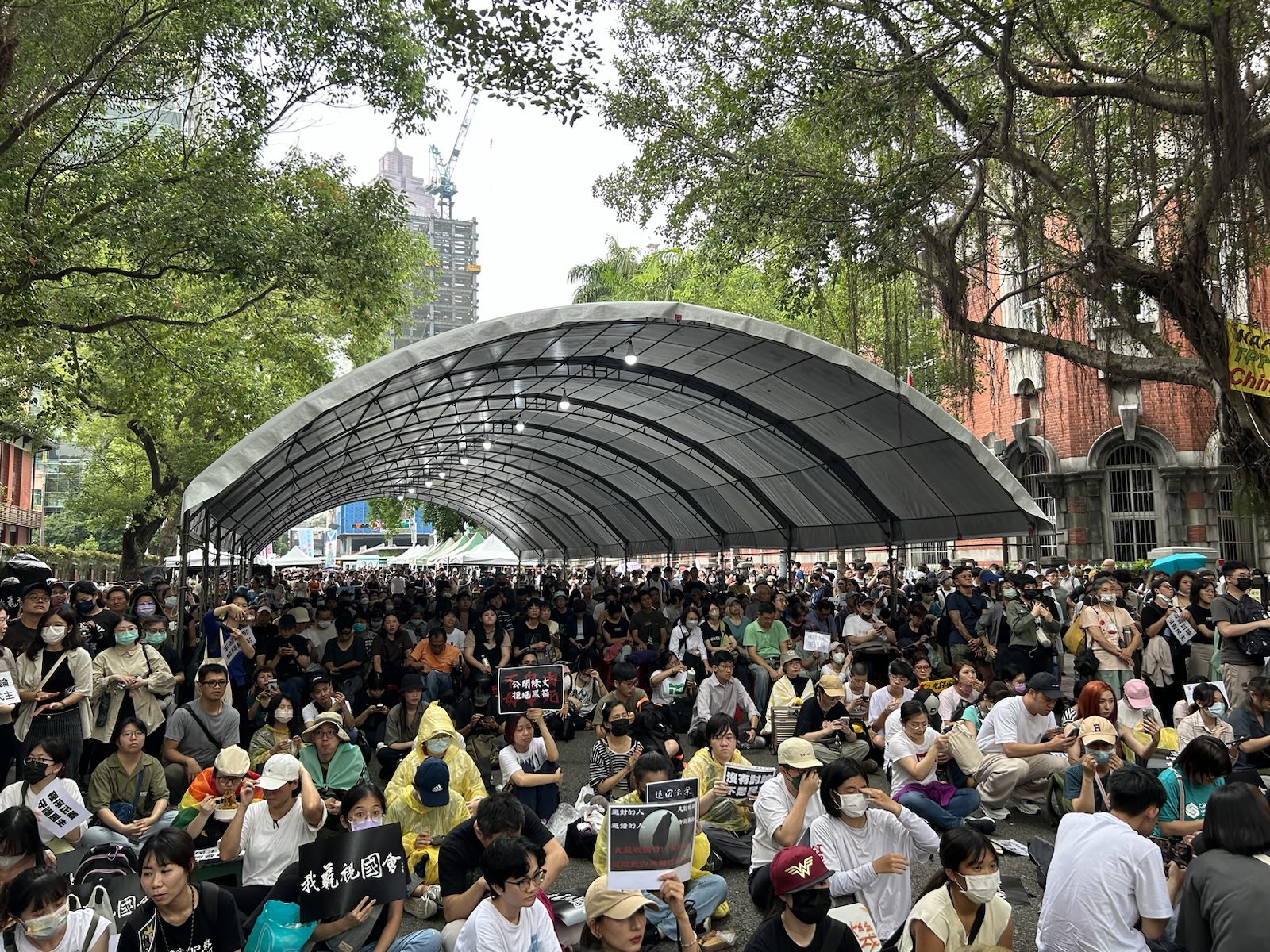 Photo credit: Brian Hioe
Photo credit: Brian Hioe
Concern about the agreement has led to a statement condemning the KMT and TPP’s actions by thirty experts. This includes two former directors of the American Institute in Taiwan (AIT), the US’s de facto embassy in Taiwan in lieu of official diplomatic relations, former members of the Hong Kong Legislative Council, and the leader of the Cambodian opposition, and others. The Taiwan Bar Association and Taipei Bar Association also both condemned the move.
This legal push by the KMT took place in the wake of efforts by the KMT to reinstate the Special Investigation Division (SID) and place this under the control of the legislature. The SID is a section of the Ministry of Justice used to conduct political investigations and arrests, including the wiretapping of then-DPP minority whip Ker Chien-ming and KMT majority speaker Wang Jinpyng by former president Ma Ying-jeou in what was known as the “September Political Struggle,” an event that outraged the public because Ma was seen as using the government to persecute political opponents. Given its controversial reputation, the SID was dissolved by Tsai Ing-wen when she took office.
 Photo credit: Brian Hioe
Photo credit: Brian Hioe
The KMT would be taking advantage of its current slight majority in the Legislative Yuan, if it votes together with the TPP. Apart from that the TPP’s cooperation with the KMT on such a controversial measure cements the view of the TPP as a pan-Blue party, one notes how the KMT decided to try and expand legislative power to override executive power rather than simply wait to try and win the next presidential election as another party might, because it does not view itself as able to win presidential elections at present. While the KMT has embraced the narrative that the changes it pushes for are to expand legislative oversight over the executive branch of government, in reality, they blur the lines between the legislative and judicial branches of government in granting new powers to the legislature.
Although such legislation was on the horizon for some time, before last Friday, the issue was not widely discussed. However, fights that broke out in the legislature led to increased public attention, particularly after popular DPP legislator Puma Shen–known as an expert on disinformation and civil defense–was injured and hospitalized. Four DPP legislators and one KMT legislator were injured in the fighting.
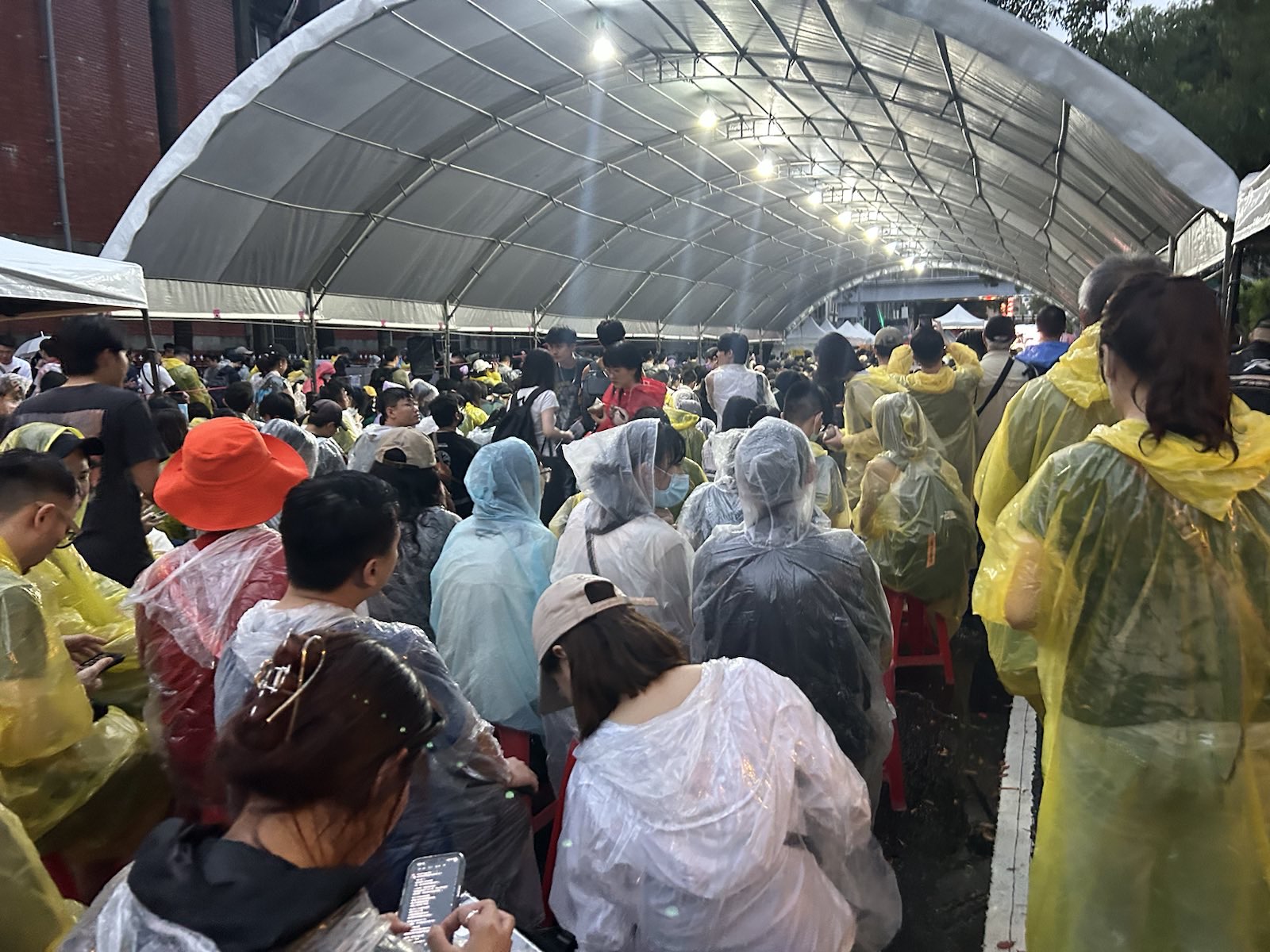 Photo credit: Brian Hioe
Photo credit: Brian Hioe
Further outraging of the public was the means by which the KMT and TPP tried to push the changes into law. Namely, the bill was advanced to its second reading without line-by-line committee review.
This move was seen as reminiscent of the KMT’s actions that sparked the 2014 Sunflower Movement, in which the KMT tried to force the Cross-Strait Services Trade Agreement into law by skipping committee review. The trade agreement, which was to be signed with China, would have allowed for Chinese investment in Taiwan’s service sector industry and it was feared that this would have a deleterious effect on Taiwan’s political freedoms.
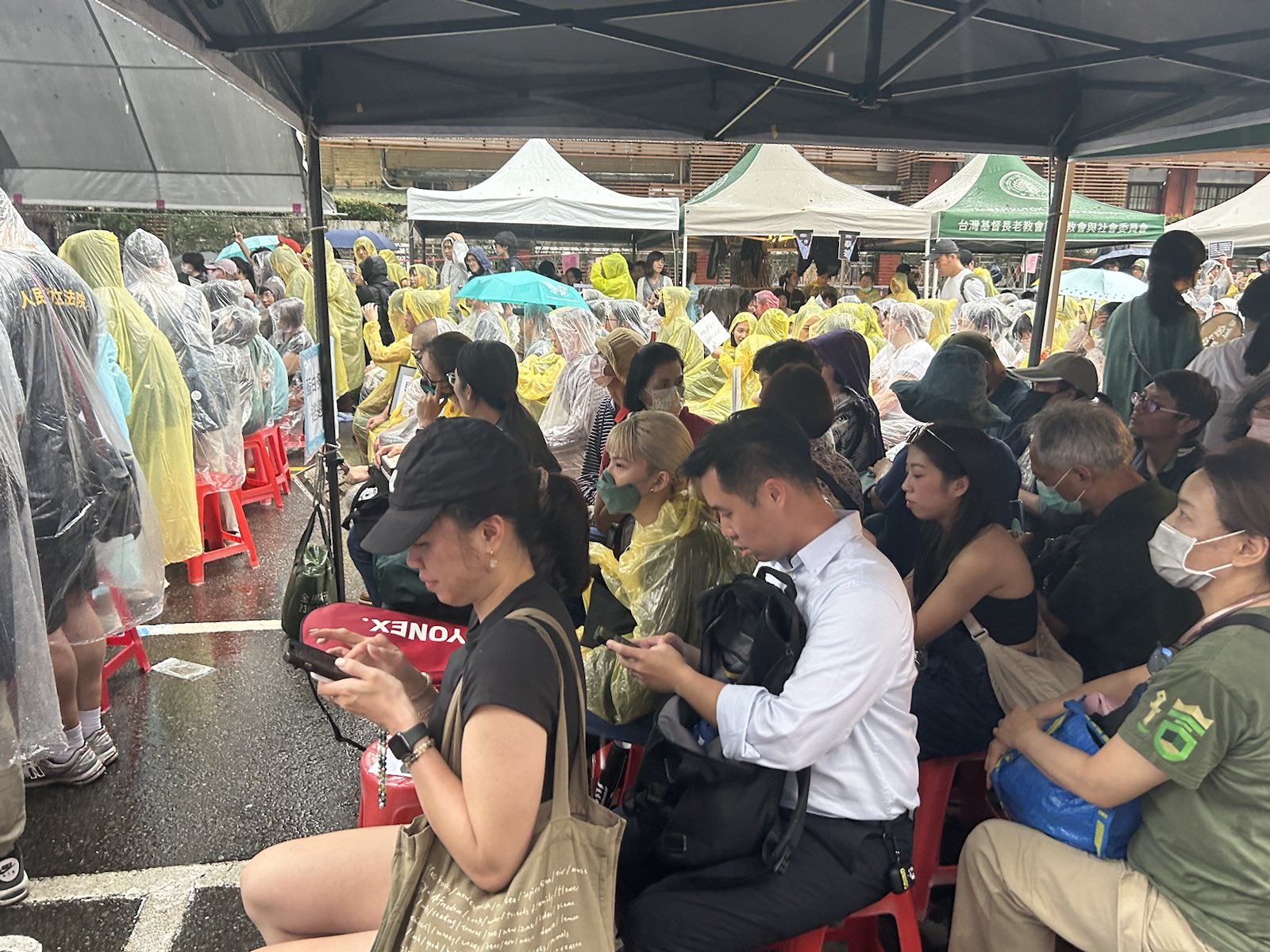 Photo credit: Brian Hioe
Photo credit: Brian Hioe
Consequently, a spontaneous protest broke out on Friday night against the planned changes, drawing three hundred to four hundred individuals. Protesters draw comparisons to the Sunflower Movement, in terms of that the KMT had again used “black box” means, lacking transparency, to force through legal changes that would have a large impact on Taiwan’s political freedoms. The protest dispersed after midnight, when the legislature ended the session.
A follow-up protest was planned for today, when the legal agreements would next be discussed. The original plan for a demonstration to take place at 6:30 PM, but with the bill scheduled to be discussed starting in the morning, a full day’s program of events was announced, starting at 9 AM. With the Economic Democracy Union, one of the key organizations behind the Sunflower Movement, obtaining the rights to demonstrate on Qingdao East Road, some camped out overnight.
 Photo credit: Brian Hioe
Photo credit: Brian Hioe
This timing of events took place in a similar timeframe to the presidential inauguration on Monday. On Sunday, the TPP demonstrated against the outgoing Tsai administration and incoming Lai administration, as well as in support of the changes, drawing 8,000 individuals. This raised the stakes for today’s demonstration.
An estimated 3,000 were present by noon. Clashes in the legislature also took place by morning. Many of those who gathered early on were high school students, showing that it is not the case that all young people support the TPP, in spite of the TPP’s visible support from youth and the DPP’s declining support in past years.
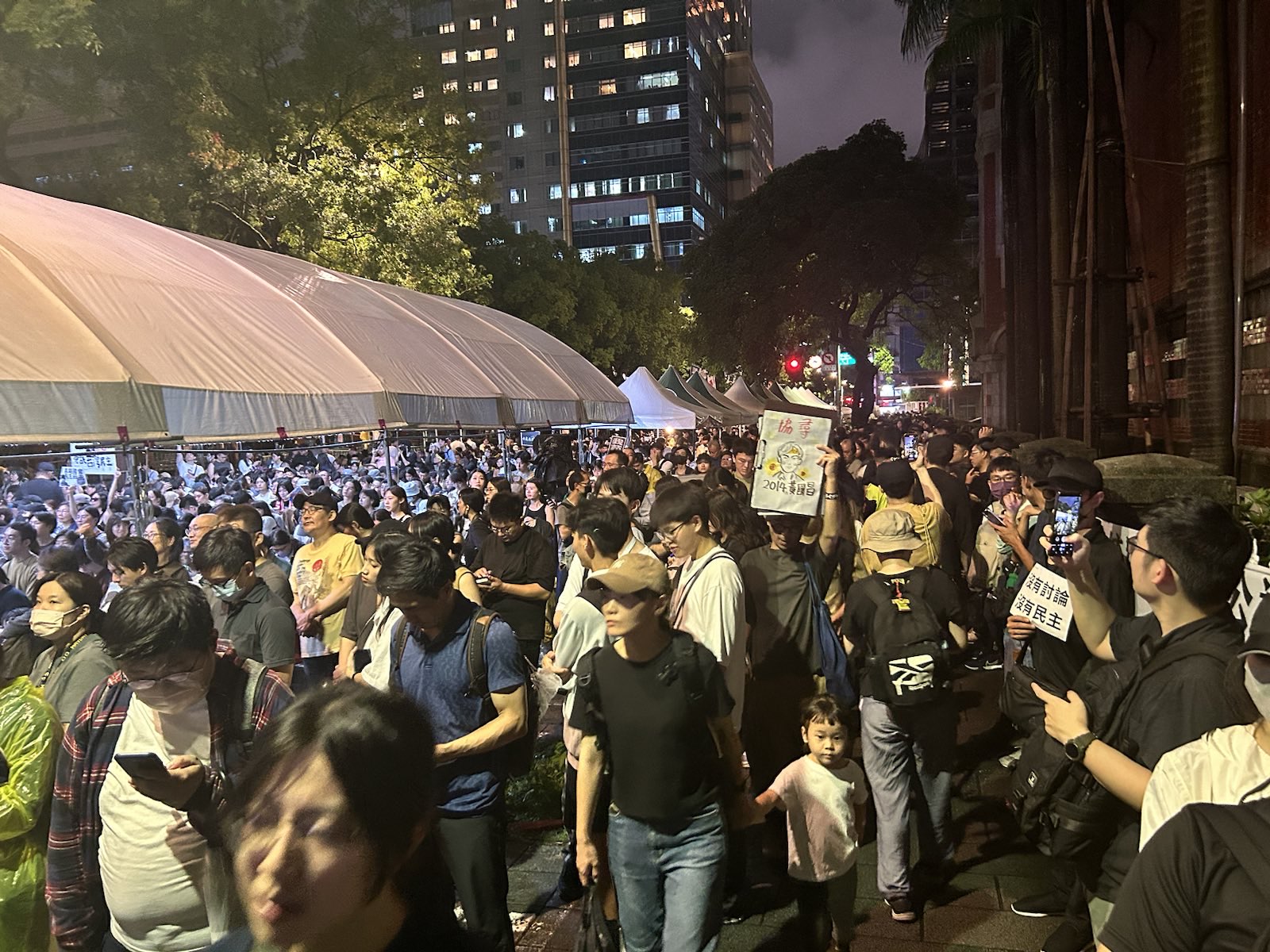 Photo credit: Brian Hioe
Photo credit: Brian Hioe
The demonstration quickly developed the hallmarks of an occupation, then as it expanded in size after police blocked off the east side of Qingdao East Road, spilled over to Zhongshan South Road, and Jinan South Road, with three stages set up. Many students arrived after classes let out. Stalls were set up for medical supplies, many of which were donated by supporters, to hand out stickers, flyers with information about the new legal changes, and other functions. When heavy rain began in the evening, demonstrators asked those present to fold up their umbrellas and handed out plastic raincoats. Still others handed out business cards with information about what to do in the case of arrest.
Much ire was directed at former Sunflower Movement leader Huang Kuo-chang for defecting to the pan-Blue camp, with some speakers bringing up that this was not the first time in Taiwanese history that there had been such a political betrayal. Fu Kun-chi was also criticized for his prominent role in the KMT at present, despite his longstanding reputation for political corruption.
Indeed, a roast of Huang Kuo-chang was organized on the side of Zhongshan South Road. Someone played a saxophone while demonstrating. To this extent, supporters sent flowers to the occupation. 1,000 meals were provided by the Che-lam Presbyterian Church to demonstrators.
 Photo credit: Brian Hioe
Photo credit: Brian Hioe
This rapid self-organization, a hallmark of occupation-style movements, was also reminiscent of the Sunflower Movement. Many of the speeches by speakers ranging from YouTuber Froggy Chiu to Taipei city councilor Miao Poya, reflected on how the KMT had learned little since the Sunflower Movement, and how the KMT still proved dangerous to Taiwanese sovereignty and sought to sell it out. Nymphia Wind, the first Taiwanese winner of RuPaul’s Drag Race, also made an appearance. When DPP legislators appeared, they were cheered, even if other speakers emphasized this was not a rally in support of the DPP. Many speakers brought up Taiwan’s history of authoritarianism and political violence and today’s political freedoms were only won through struggle.
Speakers came from a number of backgrounds, including Hongkongers, new immigrants to Taiwan, and others. At one point, a trans activist spoke of how the KMT would block legislation supportive of gender and sexual equality if it controlled the legislature. When a series of Indigenous pastors spoke, they led the crowd in chanting slogans in a number of Indigenous languages.
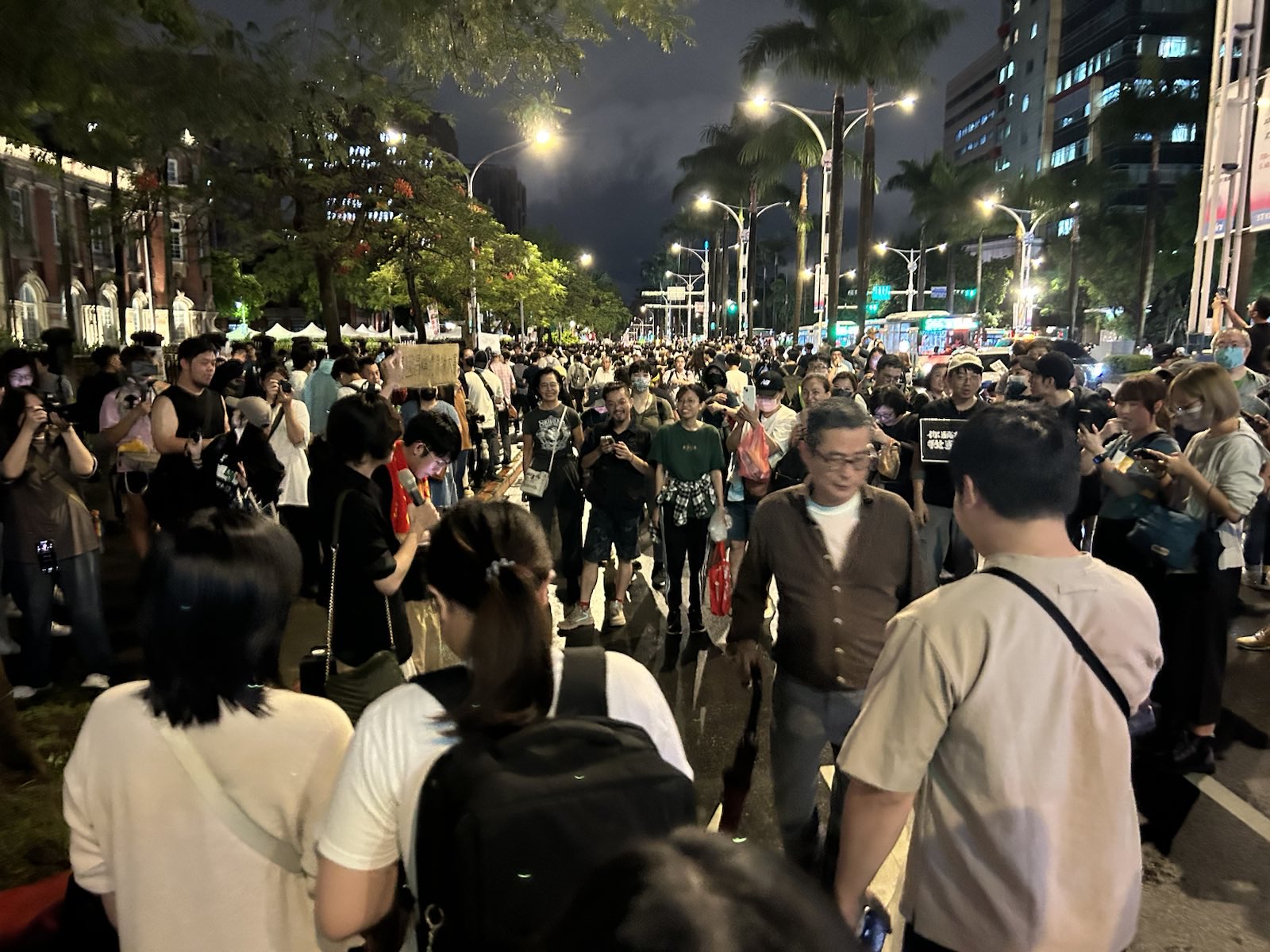 Photo credit: Brian Hioe
Photo credit: Brian Hioe
The proceedings within the Legislative Yuan were projected on a screen during this time. The legislative session was extended to midnight, with several votes called for by the KMT during this time. Many were angered by KMT Legislative Yuan president Han Kuo-yu cutting off statements by the DPP after three minutes each, as well as the vote would not record who voted for the changes, further increasing the lack of transparency. As such, the protests are expected to go to at least midnight.
If the legal changes do not pass tonight, the 24th and the 28th are other times when they will come up for discussion, meaning that there is likely to be further protest then. The situation is still developing.

